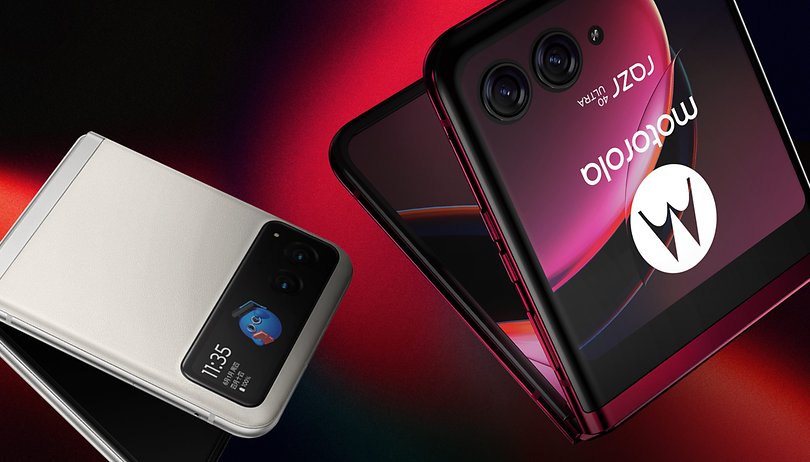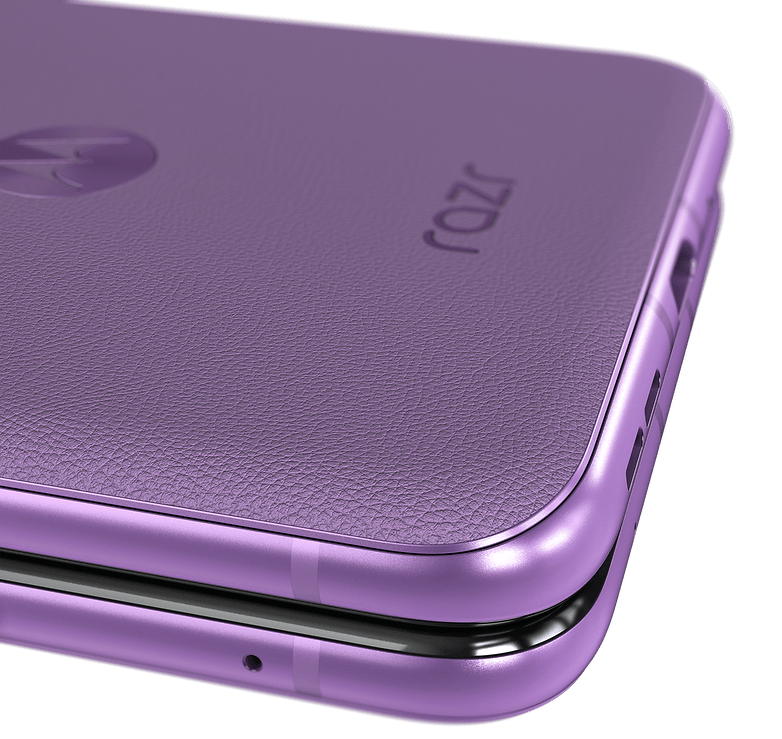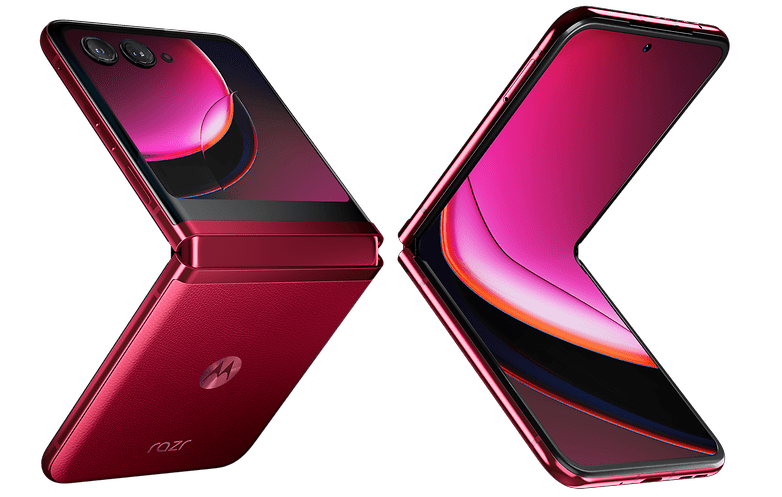Motorola Razr vs Razr+: Which 2023 Foldable Smartphone is Best for You?


Motorola has renewed its range of foldable smartphones with the launch of the Razr (2023) and Razr+ (2023). To help you choose between the new Razrs, we've compared Motorola's two new foldables.
Until we can test the smartphones and give you our full review, this comparison is based on the Motorola Razr (2023) and Razr+ (2023) specifications. As soon as we've tested both smartphones, we'll update this article accordingly.
- Read also our selection of the best foldable smartphones to choose in 2023
Motorola Razr (2023) vs Razr+ (2023): Face-to-face
| Flagship foldable | Mid-range | |
|---|---|---|
| Product |
Motorola Razr+ (2023)
Motorola Razr 40 Ultra |
Motorola Razr (2023)
Motorola Razr 40 |
| Picture |

|

|
| Internal display | 6.9'' OLED 2640 x 1080 pixels (413 PPI) 165 Hz refresh rate |
6.9'' OLED 2640 x 1080 pixels (413 PPI) 144 Hz refresh rate |
| External display | 3.6'' OLED 1066 x 1056 pixels (413 PPI) 144 Hz refresh rate |
1.5'' OLED 194 x 368 pixels (282 PPI) 60 Hz refresh rate |
| Processor | Snapdragon 8+ Gen 1 | Snapdragon 7 Gen 1 |
| RAM | 8 / 12 GB LPDDR5 | 8 GB LPDDR4X |
| Storage | 256 / 512 GB UFS 3.1 | 128 (US) / 256 (Global) GB UFS 2.2 |
| microSD | ❌ | |
| Software | Android 13 | |
| Camera | Main: 12 MP, f/1.5, OIS Wide: 13 MP, f/2.2, 108° FOV |
Main: 64 MP, f/1.7, OIS Wide: 13 MP, f/2.2, 120° FOV |
| Selfie | 32 MP, f/2.4 | |
| Battery | 3800 mAh | 4200 mAh |
| Charging | 30 W wired charging (Global: 33 W) 5 W wireless charging |
|
| Connectivity | 5G | Wi-Fi 6e | Bluetooth 5.3 | NFC | |
| IP certification | IP52 | |
| Dimensions | Open: 73.95 x 170.83 x 6.99 mm Closed: 73.95 x 88.42 x 15.1 mm |
Open: 73.95 x 170.82 x 7.35 mm Closed: 73.95 x 88.24 x 15.8 mm |
| Weight | 188.5 g | 188.6 g |
| Rating |
|
|
| Offers* | ||
Table of Contents:
- Motorola Razr (2023) vs Razr+ (2023): Design and screen
- Motorola Razr (2023) vs Razr+ (2023): Performance
- Motorola Razr (2023) vs Razr+ (2023): Camera
- Motorola Razr (2023) vs Razr+ (2023): Interface/OS
- Motorola Razr (2023) vs Razr+ (2023): Battery life and fast charging
- Motorola Razr (2023) vs Razr+ (2023): Price and availability
- First impressions
Motorola Razr (2023) vs Razr+ (2023): Design and screen
The Motorola Razr (2023) and Plus (2023) look very similar. The most notable difference is the much larger cover screen on the Razr+ (2023). Overall, both smartphones follow the design of the Razr 2022 NextPit tested last year. As a result, they are both fairly compact, well-finished smartphones.
- See also our selection of the best compact smartphones in 2023
The Razr (2023) features a 6.9-inch OLED main display with FHD+ resolution (2640 × 1080 pixels) at 413 PPI, a 144 Hz refresh rate, and a 22:9 aspect ratio. The cover screen uses a 1.5-inch OLED panel with a resolution of 194 × 368 pixels (282 PPI) and a refresh rate of 120 Hz.
The Razr+ (2023) uses the same internal screen, with the difference that its refresh rate is 165 Hz. It has a 3.6-inch OLED cover screen with a resolution of 1066 × 1056 pixels (413 PPI) and a refresh rate of 120 Hz. The Razr+ (2023)'s cover screen occupies almost the entire half of the back.
Both main screens are LTPO and HDR10+ certified. They also cover the DCI-P3 color space and have 10-bit color depth. In both cases, the maximum peak brightness is 1400 Nits and the touch sampling rate is 240 Hz (360 Hz in gaming mode).
- AMOLED, LCD, LTPO, we explain it all in our complete guide to smartphone screen technologies

In terms of build quality, the Razr+ (2023) features an aluminum frame and Gorilla Glass Victus on both the front and rear, while the latter is only present on the external screen of the Razr (2023). Both smartphones are IP52-certified. The Razr (2023) has a faux-leather finish, while the Razr+ (2023) is made of glass, except for its Viva Magenta color, which also adopts the vegan leather finish.
As for colors, the Razr (2023) is available in Sage Green, Vanilla Cream, and Summer Lilac, while the Razr+ (2023) comes in Infinite Black, Glacier Blue, and Viva Magenta.
Finally, the Razr (2023) is a hair less wide, less tall, and less thick than the Razr+ (2023).
Motorola Razr (2023) vs Razr+ (2023): Performance
While the design is quite similar, Motorola has clearly differentiated its new foldable smartphones in terms of performance. The Razr (2023) is equipped with Snapdragon 7 Gen 1, a mid-range SoC, while the Razr+ (2023) plays in the big league with its Snapdragon 8+ Gen 1. The base model features 8 GB of LPDDR5 RAM and 128 or 256 GB of UFS 2.2 storage.
The Razr+ (2023) goes one step further, with 8 or 12 GB of LPDDR5 RAM and, above all, 256 or 512 GB of UFS 3.1 storage. Given these features, it's pretty clear that the Razr+ (2023) will outperform the Razr (2023). But that doesn't mean the base model will be bad. After all, the Snapdragon 7 Gen 1 is still a pretty powerful SoC, although it doesn't offer quite as many possibilities. We'll know for sure once we've tested both smartphones.
- See also our complete guide to SoCs for smartphones
Both smartphones are 5G compatible, and in terms of connectivity, there's Wi-Fi 6e, Bluetooth 5.3, and NFC. There are also Dolby Atmos and spatial audio-compatible stereo speakers.
Motorola Razr (2023) vs Razr+ (2023): Camera
Although at first glance the camera modules may appear identical, the Razr (2023) and Plus models do not have the same configuration. The base model features a dual photo module consisting of a 64 MP main lens and a 13 MP ultra-wide-angle lens with a 120° field of view. The Razr+ (2023) also has a 13 MP ultra-wide-angle lens but with a 108° field of view. What's more, its main lens is 12 MP.

In both cases, the ultra-wide-angle lens can also be used for macro photography, and there are several modes and functionalities. The 32 MP selfie lens is also common to the Razr (2023) and Plus.
- Also take a look at our selection of the best camera smartphones in 2023
The Razr+ (2023) is capable of shooting up to 4K at 60 fps, whereas the Razr (2023) is limited to 30 fps. Here too, it's difficult to talk about photo quality without having tested the smartphones. We'll be updating this section once we've tested both smartphones.
Motorola Razr (2023) vs Razr+ (2023): Interface/OS
The Razr (2023) and Razr+ (2023) both run Android 13 with the in-house My UX overlay. Motorola's interface is known for being simple to grasp and clean without excessive bloatware. Both smartphones should offer exactly the same software experience.
Motorola offers some interesting features such as Ready For mode and even special functions for foldable smartphones. One example is the handy Swipe to Split gesture, which lets you comfortably divide the screen to display two applications at the same time.
Regarding the update policy, you can expect to receive two major Android updates and 3 years of security patches.
Motorola Razr (2023) vs Razr+ (2023): Battery life and fast recharging
Batteries have been improved on the Razr (2023) and Plus. Motorola has chosen to integrate 4200 and 3800 mAh batteries respectively. Given that the Razr 2022 managed to last all day with its 3500 mAh battery, we can only hope that this increase in capacity will result in improved autonomy. Only full testing will show us what's really going on.
Both smartphones offer 30W wired fast charging with the proprietary TurboPower technology and 5 W wireless charging. There's no difference here, and on a positive note, the charger is included in the box.
Motorola Razr (2023) vs Razr+ (2023): Price and availability
The other major difference between the Razr (2023) and Razr+ (2023) is the price, which is yet to be confirmed for the US market.
| Motorola Razr (2023) | Motorola Razr+ (2023) | |
|---|---|---|
| 8/128GB |
tbc €899.99 |
❌
|
| 8/256GB | tbc |
$999.99 €1,199.99 |
| 12/512 GB | ❌ | tbc |

First impressions
All in all, the Motorola Razr (2023) and Plus are two foldable smartphones with fairly promising specifications. Considering that the Razr+ (2023) is the true successor to the Razr 2022, I have to admit that it brings some nice changes, notably in terms of the cover screen or the battery, but it also stagnates on certain points like the SoC, which has remained the same.
As for the Razr 2023, it's a new model and its mission seems to be to democratize foldable smartphones at a more reasonable price. I'm even tempted to say that it's the first foldable smartphone designed to be "affordable". If it proves convincing in its full test, it could have a serious update on the market.
In any case, in direct comparison, it's clear that the Razr+ (2023) will be the better of the two smartphones. But technical specifications aren't everything, and the Razr (2023) could turn out to be a pleasant surprise. I suggest you wait for our full tests to find out whether the Razr+ (2023) will make it into the pantheon of the best foldable smartphones, and whether the Razr (2023) will finally succeed in popularizing foldable smartphones.



















